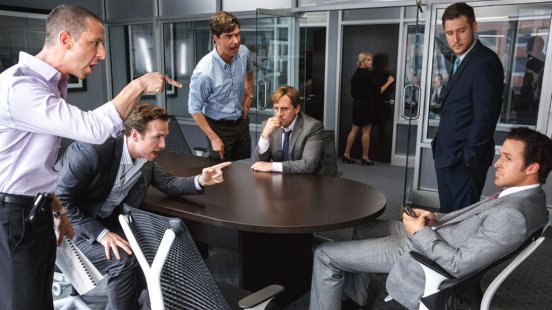Opening with the line ‘Based on a true story’ followed by a Mark Twain quote, The Big Short immediately promises to be more highbrow than one would typically expect of Adam McKay’s work (see our red carpet interview with McKay here). To be fair to McKay, he has gained a strong following for his silly yet endearing comedies – even the most cynical critic can’t help but find him or herself laughing at some of the one-liners of Ron Burgundy – which often include a blink-and-you’ll-miss-it underlying social commentary. These films include Step Brothers, The Other Guys, and, the one that started it all, Anchorman. With The Big Short, the writer-director has matured into the big leagues of Hollywood as his latest feature has garnered five nominations at the upcoming Academy awards.
Such attention may also come from the fact that long-time collaborator Will Ferrell does not appear in this film, busying himself instead with films like Get Hard and Daddy’s Home. Instead, the primary cast is filled with Oscar nominees such as Christian Bale, Steve Carell (Another career that took off with Anchorman), Ryan Gosling and Brad Pitt. They play a variety of ‘loser’ characters that also happen to be excellent with numbers, based on real-life figures. These individuals and a handful of others were able to see what everyone else in the finance and banking industry seemed to either be ignoring (or completely ignorant of) a housing and credit bubble that was going to cause the American housing market (and subsequently, financial markets globally) to collapse.
The world of greed, corruption and manipulation of the close-for-comfort past, with the movie starting in 2005, is stylishly evoked by the fast-paced, sharp editing of Hank Corwin, who intercuts images of culture and wealth that we immediately recognise, but cannot shy away from, into the story. More importantly, the emotional tone of the film (mostly analytical, but by turns also humorous, annoyed, indignant, and even tragic) is captured by the exquisite standard of acting by the cast. Bale plays the perplexing, rock music-loving Michael Burry, a performance which McKay remarks is a ‘spot on’ impersonation of the real person. Bale easily steals every scene in which he appears. Pitt’s character, retired banker Ben Rickert, plays a relatively small role in the film, but for the scenes in which he appears with John Magaro and Finn Wittrock, who play two bright, opportunistic but somewhat naïve investors, the pair are well able to hold their own with the established star. Other impressive ensembles include the morality-centred Mark Baum (played by Carell in a characterisation which could arguably have been distinguished more from that of Rickert in their similar desire for fairness and loathing for immorality) and his team of hedge funders, which find impressive players in Rafe Spall, Hamish Linklater and Jeremy Strong. Ryan Gosling takes up most of the narration as the devilish and charming Jared Vennett.
At the same time as he wants to make an exhilarating drama, Adam McKay is also determined to present the turn of events in such a way that every audience member can understand them. He also has a delightful sense of humour about the whole thing. There is one point at which Margot Robbie appears in a bath tub drinking champagne to explain some of the banking jargon being used. The sheer randomness of its comedy, use of multiple narrators, and direct audience address is a trademark that Adam adapted from films such as Election and 24 Hour Party People, and here it is works perfectly for the story at hand. The film is not without shortcomings; a side plot involving the brother of Mark Baum feels squeezed in and the ending lacks catharsis which seems more indecisive than purposeful.
Still, well worth a watch.

